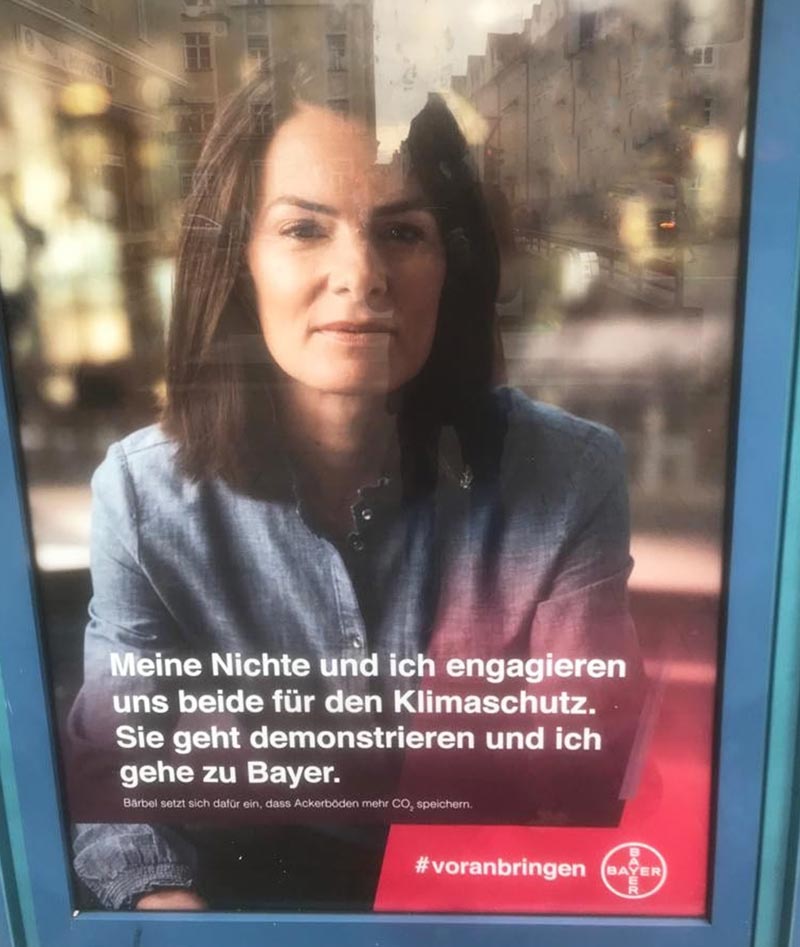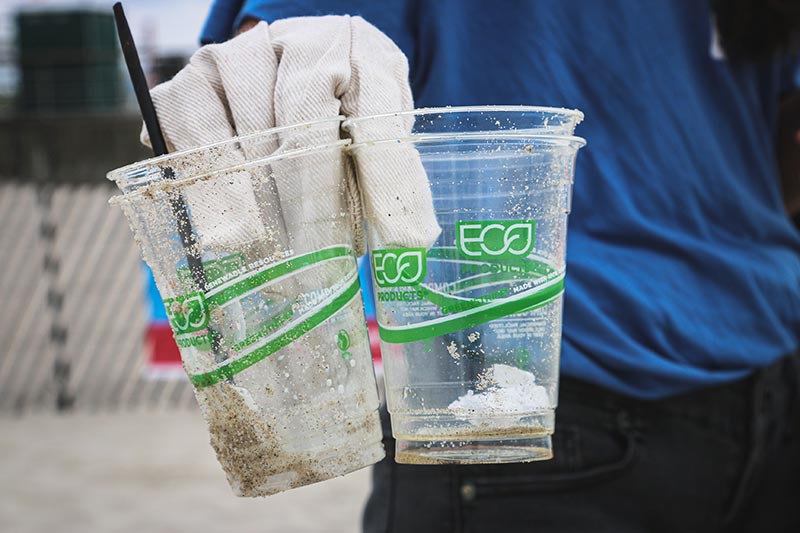Do you know what Greenwashing is? It's a term that everyone should be familiar with. Companies use targeted marketing measures to present themselves as more sustainable and environmentally friendly than they actually are. Greenwashing is primarily practiced by companies that know full well that they are destroying our environment through their products and services.
In this article, I would like to show you how companies distract from their problem areas by greenwashing and how you can recognize and expose this scam. From the definition, to unprotected terms, to examples and tips for everyday life. Let's go!
Here is another short Table of contents for you:
Documentary Tip: Be sure to check out the documentation "The Green Lie" by Werner Boote. There you will get an even deeper insight into the work of greenwashing companies.
What is greenwashing exactly?
Greenwashing refers to a company's attempt to achieve a "green image" through marketing and PR measures, but without implementing corresponding measures as part of the value creation process. This suggests environmental friendliness and corporate responsibility to consumers.₁
In this way, a company disguises counteracting activities that are harmful to the environment. Many companies often really have the intention, green marketing to operate. But they often run the risk of slipping into a kind of greenwashing, for example because of cost savings.
Forms of greenwashing
Basically, all greenwashing has one thing in common: they distract from other problemscaused by the products of the advertising company. Here I have compiled some types of greenwashing for you:
1. environmentally friendly product belittles the entire range
For example, a fashion company that uses an organic sweater on offer to greenwash its own brand, even though 98 percent of its own range is not produced sustainably.
2. green assertion and vague statements distract from the core business
For example, an energy company that advertises wind power even though 99 percent of its energy comes from coal power.
3. advertising with self-evident facts
For example, a hairspray supplier that still advertises its products as "CFC-free" even though chlorofluorocarbons have been banned as a product ingredient since the 90s.₂
4. companies from environmentally harmful industry get involved
For example, an airline that advertises that CO2emissions of every in-house flight are offset by donations to climate protection projects. Certainly not classic greenwashing, but nevertheless a marketing measure that conveys to passengers that flying is then sustainable.
5. invented cachet
For example, when a company creates its own seal for "grain from controlled cultivation", which at first glance looks like an official, protected seal.
6. juggling technical data and unclear technical terms
For example, when companies print technical numbers of ISO standards on their product packaging. This looks professional, but at second glance it is often just trickery.
7. simply report on greenwashing or sustainability yourself
For example, a food company that privatizes water sources in arid regions (leading to Water Shortage leads) and reports an article on the world's most sustainable companies on its company page and lists itself in it.₃
8. comparison with even more environmentally harmful products
For example, when a company uses a particularly environmentally harmful offering to put a slightly less harmful product in a better light.
9. influence on political decision-makers
For example, when a company persuades the Federal Minister of Food and Agriculture to relax environmental regulations.
Examples of greenwashing

I've already given you examples that explain the different forms of "greenwashing" - but of course there's a more practical way. Here are some examples of companies that are greenwashing.
Bayer
In 2018, Bayer took over the globally controversial genetic engineering company Monsanto, which has a large share in the global insect die-off. The image of the Bayer Group has also suffered extremely as a result of the takeover.
Today, the company is again trying to portray itself as greener than it is through targeted greenwashing campaigns. The above is intended to convey to our society that Bayer and climate protection go hand in hand.
German Air Transport Association (BDL)
Air traffic contributes around 4.9 percent to climate change.₄ Nevertheless, the German Air Transport Association (BDL) used targeted greenwashing and the slogan "Air traffic is the most important factor in climate change. "Flying is the new eco" and the reference to the reduced fuel consumption of aircraft the opposite.
Adidas
Adidas makes shoes from ocean waste. At least that's what the term "ocean plastic" used by Adidas for the Parley collection conveys. But Adidas has already confirmed that this is not actually ocean trash at all, but trash that is collected from coastal regions or saved from the sea.₅ The company left open how high the proportion of trash from the environment actually is in shoes and other items of clothing.
Notice: At Fashion from recycled plastic waste I have written down a few more thoughts for you.
RWE
This advertising campaign by RWE depicted an energy giant planting wind turbines. This gave the impression that RWE was a green company. In fact, at the time, the company was only sourcing about 2 percent of its energy from renewable sources. At that time, only 0.1 percent of the company's electricity came from wind turbines.₆
Nestlé
At the Nestlé food company, it's hard to know which greenwashing measure to start with. Nestlé is one of the main companies responsible for the Plastic waste vortex in the seathat are now circling in our oceans. After massive criticism of the company, those responsible failed to announce clear targets for reducing single-use plastic packaging or doing without it. The vague target to calm tempers: Plastic packaging is to be made fully recyclable or reusable by 2025 and the proportion of recycled plastic in the company's own products is to be increased - but it was not defined how high the proportion is ultimately to be. The company is therefore greenwashing with vague and unmeasurable claims.
In June 2019, the company even convinced Julia Klöckner to release a joint video in which the German Federal Minister of Food and Agriculture praised Nestlé to the skies.₇
Nestlé even publishes articles on the world's most sustainable companies on its website and simply joins the ranks itself.₈
Tip: Check out the post about Nestle criticism to learn even more.
Starbucks
Every year, around 2.8 billion Coffee2Go cups are thrown away in Germany, which cannot be recycled due to the mixed plastic. The Starbucks coffee chain is a major contributor to this environmental problem, repeatedly attracting attention with greenwashing carried out through empty promises. In 2008, for example, the company promised to offer coffee cups that were 100 percent recyclable. In addition, 25 percent of the drinks that crossed the counter were to be sold in reusable cups. 10 years later, not even one of the two goals had been achieved.₉
Coca Cola
A survey by the Break Free From Plastic initiative showed that in 484 cleanup events conducted in more than 50 countries, Coca-Cola was identified as one of the top polluters of Plastic waste in the environment is.₁₀
Coca Cola engages in brazen greenwashing by boasting about a plastic bottle made of 25 percent marine plastic, thus legitimizing the pollution of the oceans.₁₁
McDonald's
Cheap meat, chemicals, exploitation₁₂ and lots of packaging waste. For example, in 2010 the company produced around 41,000 tons of beef, 3,300 tons of poultry and 3,500 tons of pork.₁₃ This alone has caused McDonald's to emit a massive CO2-emissions. The company makes its money simply because people want to get full quickly and pay little attention to what they eat.
As something like awareness is developing in our society, those responsible reacted in 2009 and changed the background color of the logo from red to green. Today, the stores also make a much more natural and environmentally friendly impression. Of course, this does not make the fast food chain sustainable.
BP (Beyond Petroleum)
For many years, the oil company declared toxic refinery residues as harmless industrial goods and engaged in illegal waste disposal - also in Germany.
BP tried to greenwash its bad image, for example, by changing its logo and name. The logo was redesigned to a sun surrounded by green biomass. Even the traditional name was changed from "British Petroleum" to "Beyond Petroleum". Greenwashing was also done with empty promises. The solar business was supposed to be "doubled" generating enough energy for 40,000 German households per year. BP, for example, had a turnover of over 25 billion US dollars in 2005 and earned only 0.13 percent of its sales from renewable energies.₁₄ These facts then make the elaborate greenwashing attempts fizzle out rather quickly.
Notice: You will certainly notice that they are usually large corporations. These companies generate incredible profits. If they were really interested in sustainability, they would invest their profits in the development of sustainable technologies instead of in brazen greenwashing. This would certainly also have a positive effect on the company's public image.
Recognize, report and avoid greenwashing

In order not to fall for greenwashing ourselves, we have to learn to question products and offers very specifically. But basically, we as consumers do not have it easy. After all, we can't control every company and every supplier in a supply chain.
But there are some things we can do to detect greenwashing more quickly. Paying attention to the exact wording - that really helps immensely! And of course it's also worth taking a closer look at the advertising company. It is always a good sign when companies are transparent and provide insights into their work.
Tip: If you feel that a company is greenwashing and thus deceiving consumers, you can report this to the consumer advice center.
Commonly used for greenwashing but unprotected terms, images and tricks
If companies use these terms, images or tricks for their products, services and advertisements, then it could well be greenwashing:
"Ocean Plastic" / "Ozeanplastik"
The term suggests that a company manufactures products from marine waste. But often it is just cheap greenwashing, since the word can be used freely.
"Natural aroma"
Doesn't that sound nice? A strawberry yogurt with natural flavor is nothing other than a strawberry-flavored yogurt made from sawdust. The euphonious name is only permitted because sawdust is made from the natural raw material wood.₁₅
"Sustainable"
This term is also not protected and can simply be used freely without explanation. An ideal basis for greenwashing.
"Climate neutral" / "Climate friendly"
Especially since the Climate Change has now arrived to the mainstream media, these terms pile up on products and advertisements. These are also not protected and therefore free to use.
"Environmentally friendly"
It is also easy to claim that a product is environmentally friendly. As long as this is not professionally controlled and consumers do not intervene, there is no trouble for greenwashing companies.
"Organic" / "Ecological
These two terms are not protected. The terms "Bio" and "Öko", on the other hand, are protected. Here it is particularly important to pay attention to the choice of words.
"Regional" / "From here
The terms can be used without explanation. For there is neither a definition of where regionality begins, nor where it ends.
"CFC-free"
The substance has been banned by law since 1991, but even today there are still products on which, for example, the lid is decorated with this claim.
"100% environmentally friendly"
This designation is used with pleasure. But 100% environmentally friendly is fundamentally not possible! Every product has a value chain in which, for example, CO2 is emitted. This is therefore a popular phrase used for greenwashing.
Fake seals and certificates
The self-designed environmental seal "grain from controlled contract farming", for example, is not an official seal, even though it certainly gives the impression of being one.
Green color scheme
The color green usually stands for sustainability. That is why it is often used for products and services that are absolutely not sustainable.
Beautiful pictures
Notice and question the imagery! Chickens or cattle on a fresh green meadow, fresh flower meadows, baby kittens and butterflies make an impression and distract from greenwashing.
Question: Can you think of any other terms that can be misleading? Then feel free to leave me a comment.
What proprietary terms avoid greenwashing?
Most greenwashing conveys to the consumer that it is okay to buy the products and not to have a guilty conscience. But you can't be fobbed off that easily. Companies may only use the following terms if all underlying guidelines are adhered to:
"Organic" / "Eco
The terms are protected by law and may only be used in compliance with all underlying guidelines.
"From controlled organic cultivation"
This term is also protected and may not be used without verified proof.
So, to avoid inadvertently supporting greenwashing, you should be deliberate in your choice of words.
Tip: Use the NABU seal check app! It shows you by a simple photo of the product whether food is ecologically recommendable or not. For the purchase is also worth the CodeCheck app. At a glance you can see, for example, whether food contains palm oil or Microplastics contain
No chance for greenwashing!
Somehow it is already indicative and very sadhow much companies are concerned with concealing activities that are Ecologically or ethically unclean and thus are also simply no longer up to date. In my opinion, those responsible for greenwashing are also disrespectful. Not only towards consumers, but above all towards their own children, who, if everyone were like their parents, would have to grow up and live in a destroyed world.
Is it worth it? Is it really worth it to work for a company that is destroying our environment and dividing our society? At this point I would like to refer once again to the sustainable job portal point out. There you will find a job with added value for you, our environment and our society. 😉 Otherwise, all we can do is continue to speak up, sign petitions and, if necessary, trigger a "shitstorm".
Do you have any questions or suggestions about the greenwashing article? Then feel free to write me a comment below this post.
Stay sustainable,

PS.: Be sure to check out my article on sustainable documentations on. There you can get even more input about the Environmental problems of our time and get their potential solutions.
References:
₁ N. Lin-Hi: Gabler Wirtschaftslexikon - Greenwashing, available at https://wirtschaftslexikon.gabler.de/definition/greenwashing-51592 [23.11.2019].
₂ n-tv Nachrichtenfernsehen GmbH: Inadmissible advertising - "CFC-free" is not an advantage, available at https://www.n-tv.de/ratgeber/FCKW-frei-ist-kein-Vorteil-article901667.html. [22.11.2019].
₃,₈ Nestlé Deutschland AG: The World's Most Sustainable Companies, available at https://www.nestle.de/storys/djsi-nachhaltigste-unternehmen-der-welt. [23.11.2019].
₄ David S. Lee, David W. Fahey, Piers M. Forster; et al.Aviation and global climate change in the 21st century, available at https://elib.dlr.de/59761/1/lee.pdf. [24.11.2019].
₅ ARD (2019): Greenwashing with "Ocean Plastic" | REPORT MAINZ, YouTube, Jul. 31, 2019, web, Nov. 24, 2019 at 09:40 AM, in: https://www.youtube.com/watch?time_continue=267&v=kny_XT5EZvM&feature=emb_logo.
₆ GREENALITY e.K.: Es Grünt So Grün: "Best Of" Greenwashing, available at https://www.greenality.de/blog/es-gruent-so-gruen-best-of-greenwashing. [25.11.2019].
₇ ZEIT ONLINE GmbH: Julia Klöckner criticized for video with Nestlé boss (as of Jun 05, 2019), available at https://www.zeit.de/politik/deutschland/2019-06/lobbyismus-julia-kloeckner-nestle-vorwurf-pr [24 Nov 2019].
₉ K. Martinho: Starbucks promises, yet again, to make a recyclable coffee cup, available at https://www.treehugger.com/corporate-responsibility/starbucks-promises-yet-again-make-recyclable-coffee-cup.html. [24.11.2019].
₁₀,₁₁ Deutsche Umwelthilfe (2019): Deutsche Umwelthilfe criticizes Coca-Cola for brazen greenwashing with single-use bottles made of marine plastic (as of 25 October 2019), available at https://www.duh.de/presse/pressemitteilungen/pressemitteilung/deutsche-umwelthilfe-kritisiert-coca-cola-wegen-dreistem-greenwashing-mit-einwegflaschen-aus-meeresp [24 November 2019].
₁₂ DER SPIEGEL GmbH & Co. KG: Employees sue McDonald's for "theft" (accessed March 14, 2014), available at http://www.spiegel.de/wirtschaft/unternehmen/mcdonald-s-mitarbeiter-in-den-usa-klagen-wegen-ausbeutung-a-958571.html. [23.11.2019].
₁₃ DER SPIEGEL GmbH & Co. KG, "McDonald's is not green!" (as of Dec. 31, 2011), available at https://www.spiegel.de/wirtschaft/unternehmen/fast-food-kette-mcdonald-s-ist-nicht-gruen-a-804272.html.
₁₄ BUND - Regionalverband Südlicher Oberrhein: Greenwash bei British Petroleum - Der BP-Schwindel (as of 17 December 2016), available at http://www.bund-rvso.de/bp-schwindel.html. [24.11.2019].
₁₅ Greensurance® Für Mensch und Umwelt UG: Caution! "Greenwashing," available at https://www.greensurance.de/einkaufsratgeber/vorsicht-greenwashing/#1485534683302-84af1a33-57f5. [23.11.2019].







Helped me super with na task for school. Thanks!!!
Always happy to help 😉
Comments are closed.